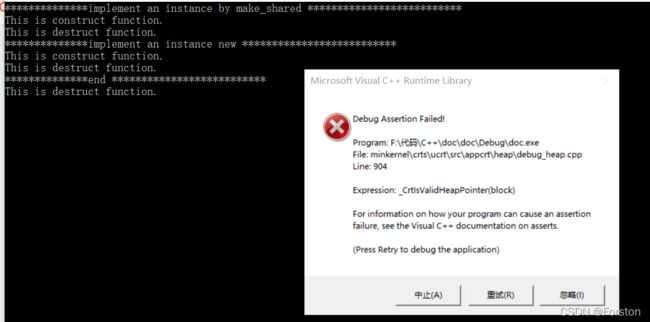- C++数据结构————二叉树
Гений.大天才
C++语言入门以及基础算法c++数据结构开发语言
【前言】在数据结构与算法的世界里,二叉树(BinaryTree)始终占据着核心地位。它既是众多高级树形结构(B+树、红黑树、线段树、字典树……)的“基因”,又是面试、竞赛与工程实战中绕不开的考点。本文将用大约2万字的篇幅,从“零”开始,把C++二叉树的所有常见形态、常见算法、常见坑点与常见优化一次性讲透。全文配套可编译运行的C++17/20代码2000余行,所有示例均在GCC13/Clang17/
- 数据结构——线性表(C++)
线性表一、线性表的定义二、线性表的抽象数据类型三、线性表的顺序存储1.顺序存储定义2.顺序存储的实现方式四、线性表的链式存储五、其他线性表参考一、线性表的定义线性表:零个或多个数据元素的有限序列。线性表是最常用且是最简单的一种数据结构。形如:A1、A2、A3….An这样含有有限的数据序列,我们就称之为线性表。线性表包括顺序表和链表。顺序表(其实就是数组)里面元素的地址是连续的,链表里面节点的地址不
- 数据结构——线性表
木子杳衫
数据结构c++c#
目录一、线性表的定义二、线性表的分类(1)顺序表(2)单链表三、最常见的基本操作四、C/C++实现(1)顺序表1、静态顺序表1)定义其数据类型。2)相关代码。2、动态顺序表1)定义其数据类型。2)相关代码(2)单链表1、带头结点1)初始化2)判空3)查找4)插入4)删除2、不带头结点1)初始化2)判断是否为空3)插入(3)扩展1、双链表1)初始化2)删除3)销毁2、循环单链表1)初试化3、循环双链
- 【C++】C++内存分配与动态内存管理
Sherry的成长之路
C++学习c++开发语言c语言
个人主页:@Sherry的成长之路学习社区:Sherry的成长之路(个人社区)专栏链接:C++学习长路漫漫浩浩,万事皆有期待文章目录C++内存分配与动态内存管理1.C/C++内存分布2.C语言中动态内存管理方式3.C++中动态内存管理方式3.1new和delete操作内置类型3.2new和delete操作自定义类型4.operatornew和operatordelete函数5.new和delete
- 2025年GESP3月认证C++六级真题解析
信奥源老师
GESP等级考试C++真题解析c++算法信奥赛数据结构GESP
单选题(每题2分,共30分)第1题在面向对象编程中,类是一种重要的概念。下面关于类的描述中,不正确的是()。A.类是一个抽象的概念,用于描述具有相同属性和行为的对象集合。B.类可以包含属性和方法,属性用于描述对象的状态,方法用于描述对象的行为。C.类可以被实例化,生成具体的对象。D.类一旦定义后,其属性和方法不能被修改或扩展。答案:D解析:类定义后,可以通过继承、组合等方式进行扩展,也可以在一定程
- 2024年09月CCF-GESP编程能力等级认证C++编程四级真题解析
码农StayUp
c++CCFGESP编程能力等级认证
本文收录于专栏《C++等级认证CCF-GESP真题解析》,专栏总目录:点这里。订阅后可阅读专栏内所有文章。一、单选题(每题2分,共30分)第1题在C++中,()正确定义了一个返回整数值并接受两个整数参数的函数。A.intadd(inta,intb){returna+b;}B.voidadd(inta,intb){returna+b;}C.intadd(a,b){returna+b;}D.voida
- 随笔记
龙的心_48aa
新的模式下,人们争先恐后的抢占先机,未来的市场,是适应这种模式,还是淘汰这种模式!静观其变,以不变应万变!
- c++内存管理与模板初阶
Slowstep_
c++c语言数据结构
文章目录虚拟进程地址空间区域new和deletenew的失败机制new/delete原理重载operatornew和operatordeletenew[]/delete[]定位newnew多维数组模板虚拟进程地址空间c/c++的一个程序在内存区域中的划分:由低地址到高地址依次是:代码区->已初始化全局数据区->未初始化全局数据区->堆区->栈区。其中堆区和栈区是相对而生的,堆区和栈区之间有很大的镂
- UE4中通过C++配合蓝图编程常见的方式
Lif68
委托例子比如我要弄一个叫OnRespawn的委托.h中可以这样声明DECLARE_DYNAMIC_MULTICAST_DELEGATE(FOnRespawn);这样你就能新建蓝图可以引用的委托了UPROPERTY(BlueprintAssignable,Category="Delegate")FOnRespawnonrespawn;*用来在c++中呼叫,让蓝图读到委托的工具函数voidHandle
- 随笔21
菜菜菜小姐
今日的关键词:人生若只如初见。最近常常在想这句话,人与人的相处真是很奇妙。我觉得距离感和分寸感真得很重要。可能大概是因为我开始社恐了吧。“社恐”这个词用在我身上可能我身边所有的人都会觉得一点都不像,恰恰相反,在外人眼中我大概是“社交牛逼症”的那一位。其实,只有自己才最了解最真实的自己,成年后的生活,每一个外人所了解的自己都只是我们想让别人看到的自己。这两年,总会有朋友说学习碰到学校的同事,都是我是
- 深入探索C++ STL:从基础到进阶
目录引言一、什么是STL二、STL的版本三、STL的六大组件容器(Container)算法(Algorithm)迭代器(Iterator)仿函数(Functor)空间配置器(Allocator)配接器(Adapter)四、STL的重要性五、如何学习STL六、STL的缺陷总结引言在C++的世界里,标准模板库(STL)是一项极为强大的工具。它不仅为开发者提供了可复用的组件库,更是一个融合了数据结构与算
- 【C++进阶】二叉搜索树特性 && 二叉搜索树模拟实现
花影随风_
数据结构算法
0.前言(对学习map与set内容的铺垫)我们之前在c语言部分数据结构初阶就已经讲过二叉树了,为什么那时我们不讲二叉搜索树呢?这是有原因的,这里讲二叉树进阶是因为:1.map与set特性需要先铺垫二叉搜索树的概念,理解了二叉搜索树可以更好的理解map与set2.当时用c语言讲二叉树时没有将进阶,是因为这部分较难,长时间下容易忘记。3.一些OJ题更适合用c++解决,当时用c语言会比较麻烦,需要动态开
- 探索OpenCV 3.2源码:计算机视觉的架构与实现
轩辕姐姐
本文还有配套的精品资源,点击获取简介:OpenCV是一个全面的计算机视觉库,提供广泛的功能如图像处理、对象检测和深度学习支持。OpenCV3.2版本包含了改进的深度学习和GPU加速特性,以及丰富的示例程序。本压缩包文件提供了完整的OpenCV3.2源代码,对于深入学习计算机视觉算法和库实现机制十分宝贵。源码的模块化设计、C++接口、算法实现、多平台支持和性能优化等方面的深入理解,都将有助于开发者的
- C++ 类型转换相关
此心安处是吾乡1024
C++面试题c++开发语言
目录前言C语言中的类型转化类型转换static_cast(exp)const_cast(exp)dynamic_cast(exp)reinterpret_cast(exp)总结前言这一部分,我们主要说说C++中的类型转换相关,注重是关于这个问题,回答这个问题.类似于面试题一样~~C语言中的类型转化强制类型转换:T(exp)函数类型转换:T(exp),传入exp,返回一个T类型的变量,以完成转换.出
- 什么是c语言函数,C语言中的函数是什么意思
weixin_39986543
什么是c语言函数
C语言中的函数是什么意思简单来说函数就是c语言的模块,一块块的,有较强的独立性,但是可以相互调用。这是c和c++区分的地方,c++面向对象,对象独立完成功能,无需调用。一个c程序就可以是一个函数,里面再包含n个函数。【延展】C语言中函数和函数体的区别是什么?第一、简单来说函数就是c语言的模块,一块块的,有较强的独立性,但是可以相互调用。一个c程序就可以是一个函数,里面再包含n个函数,有固定输入和输
- 为广大网友收集的经典小游戏合辑(VC++),你想要的都有
程序员欧阳沐
很多经典小游戏合辑(VC++),有超级玛丽,坦克大战,黑白棋,飞机大战,还有两款不知道名字,还附有源码,学习和娱乐都有哦。源码目录结构图:部分源码展示(由于源码比较多,所以就不在此全部展示,需要的可以私信me):如果你想学c++编程可以私信小编,发送“01”获取源码或2019年最新学习资料“从零基础到精通”。部分资料展示如下:您的关注便是小编每日不断更新分享的源动力,谢谢。学c++可抠裙:74五五
- 【回溯法】n皇后问题 C/C++ (附代码)
haaaaaaarry
算法设计与分析c语言c++开发语言回溯法算法
问题描述在一个n*n的棋盘上放置彼此不受攻击的n个皇后,按照国际象棋规则,皇后可以攻击与其在同一行,同一列或者同一对角线的其他皇后,求合法摆放的方案数。问题分析通过递归和回溯的方法,逐行放置皇后,并在每一步检查当前位置是否安全。如果安全,则继续放置下一个皇后;如果不安全,则回溯到上一步,尝试其他位置。代码数据结构intx[]:存放解向量,即第i个皇后的位置intsum:记录解的个数#define_
- 面试高频题 力扣 130. 被围绕的区域 洪水灌溉(FloodFill) 深度优先遍历(dfs) 暴力搜索 C++解题思路 每日一题
Q741_147
C/C++每日一题:从语法到算法面试leetcode深度优先c++洪水灌溉
目录零、题目描述一、为什么这道题值得你花时间掌握?二、题目拆解:提取核心关键点三、解题思路:从边界入手,反向标记四、算法实现:深度优先遍历(DFS)+两次遍历五、C++代码实现:一步步拆解代码拆解时间复杂度空间复杂度七、坑点总结八、举一反三九、总结零、题目描述题目链接:被围绕的区域题目描述:示例1:输入:board=[[“X”,“X”,“X”,“X”],[“X”,“O”,“O”,“X”],[“X”
- C++内存管理
1.C/C++内存分布我们先来看这样的一道题:intglobalVar=1;staticintstaticGlobalVar=1;voidTest(){staticintstaticVar=1;intlocalVar=1;intnum1[10]={1,2,3,4};charchar2[]="abcd";constchar*pChar3="abcd";int*ptr1=(int*)malloc(si
- 【C++基础】内存对齐原则与性能影响:面试高频考点与真题解析
byte轻骑兵
#C++深度探索与实战专栏面试职场和发展
在计算机系统中,内存对齐是影响程序性能和跨平台兼容性的重要因素。无论是校招还是社招,内存对齐相关问题几乎是C/C++、嵌入式开发、操作系统等岗位的必考题。掌握内存对齐的原理和应用,不仅能应对面试,更是理解现代计算机体系结构的关键。一、内存对齐的基本概念1.1什么是内存对齐?内存对齐是指数据在内存中存储时,其起始地址必须是某个特定值(通常是数据类型大小的倍数)。例如,4字节的int类型变量应存储在4
- 轻松掌握EasyX图形库在Visual C++ 6.0中的应用
Randy Rhoads
本文还有配套的精品资源,点击获取简介:EasyX图形库为VisualC++6.0环境提供了简便的图形界面编程功能。它包括丰富的图形绘制、图像处理、文字操作、图形变换和事件处理等核心特性,辅以详细的API文档和示例代码。该库支持在多个操作系统版本上运行,且具有优化的性能,极大地简化了图形界面的开发流程。1.easyX图形库概述1.1引言easyX图形库是一个基于Windows操作系统的简单易用的图形
- C++中vector和list的优缺点对比以及deque
WangJiaLeLeLeLe
c++开发语言数据结构
两者基本上优缺点互补vector:优点:1、尾插尾删效率不错,支持高效下标随机访问2、物理空间连续,所以告诉缓存利用效率高缺点:1、空间需要扩容,扩容有代价2、头部和中间插入删除效率低list优点:1、按需申请释放空间,不需要扩容2、任意位置插入删除缺点:1、不支持下标的随机访问vector和list的缝合怪——deque开辟若干个数组(buff),还有一个中控数(是一个指针数组ptr),会试图把
- C ++ 中的指针和引用的区别
ice.Ynov23
C++学习笔记c语言c++算法
目录C++中的指针和引用的区别1.定义与初始化2.内存与地址3.操作灵活性4.使用场景5.语法对比6.代码示例7.关键区别总结C++中的指针和引用的区别1.定义与初始化指针:可以声明时不初始化(但建议初始化为nullptr避免野指针)可以指向不同的对象(重新赋值)使用*声明和解引用 intx=10; int*p=&X; p=nullptr;引用:必须初始化,且一旦绑定到一个对象后不能更改(不可重新
- C++ 固有的不可移植特性
为了支持底层编程,C++定义了一些固有的不可移植的特性,即因机器而异的特性,当将含有不可移植特性的程序从一台机器转移到另一台机器上时,通常需要重新编写该程序。1位域 类可以将其非静态数据成员定义成位域,在一个位域中含有一定数量的二进制位。当一个程序需要向其他程序或硬件设备传递二进制数据时,通常会用到位域。位域在内存中的布局是与机器相关的且位域的类型必须是整型或枚举类型。typedefunsi
- 【算法】哈希映射(C/C++)
摆烂小白敲代码
哈希算法算法c语言c++数据结构
目录算法引入:算法介绍:优点:缺点:哈希映射实现:mapunordered_map题目链接:“蓝桥杯”练习系统解析:代码实现:哈希映射算法是一种通过哈希函数将键映射到数组索引以快速访问数据的数据结构。它的核心思想是利用哈希函数的快速计算能力,将键(Key)转换为数组索引,从而实现对数据的快速访问和存储。哈希映射在现代软件开发中非常重要,它提供了高效的数据查找、插入和删除操作。算法引入:小白算法学校
- C++ Primer Plus 第6版 中文版 清晰有书签PDF+源代码
内容提要:C++是在C语言基础上开发的一种集面向对象编程、通用编程和传统的过程化编程于一体的编程语言,是C语言的超集。《C++PrimerPlus中文版》由StehpenPrata著,张海龙、袁国忠译:是根据2003年的ISO/ANSIC++标准编写的。通过大量短小精悍的程序详细而全面地阐述了C++的基本概念和技术。全书分为18章和10个附录,分别介绍了C++程序的运行方式、基本数据类型、复合数据
- C++ 实现多继承和组合
uj_
C++C++继承和组合
设计一个计算机系统类,由软件和硬件组合而来使用c++的继承和组合思路首先定义一个硬件和软件类,包含各自的数据成员和成员函数采用多继承实现计算机系统类采用组合实现计算机系统最后在main()中进行测试#include#includeusingnamespacestd;classCHard{public:CHard(char*bn){strcpy(bodyname,bn);}CHard(CHard&h
- 【读书笔记】《Effective Modern C++》第二章:auto
《EffectiveModernC++》第二章:auto一、为何提倡使用autoC++11引入auto关键字,让编译器根据初始化表达式自动推导变量类型。在以下场景中,auto能简化代码、提升可维护性:减少冗长类型:泛型库、迭代器、函数返回类型经常写出极长的类型声明,使用auto可大幅精简。提高泛型代码可移植性:当底层容器或迭代器类型改变时,不必修改所有变量声明。减少拷贝错误:在使用右值和移动语义时
- C++继承与组合的区别
蓬莱道人
C/C++
1、继承与组合2、继承和组合的使用场景3、继承和组合的区别4、继承和组合的优缺点(1)继承的优缺点(2)组合的优缺点1、继承与组合C++程序开发中,设计孤立的类比较容易,设计相互关联的类却比较难,这其中会涉及两个概念,一个是继承(Inheritance),一个是组合(Composition)。因为二者有一定的相似性,往往令程序员混淆不清。类的组合和继承一样,是软件重用的重要方式。组合和继承都是有效
- STL 简介(标准模板库)
前言通过对C++的特性,类和对象的学习和C++的内存管理对C++基本上有了全面的认识,但是C++的核心在于STL一、STL简介什么是STLC++STL(StandardTemplateLibrary,标准模板库)是C++编程语言中一个功能强大的模板库,它提供了一系列通用的数据结构和算法。STL的设计基于泛型编程,这意味着它使用模板来编写独立于任何特定数据类型的代码。STL的核心组件包括容器(如向量
- 用MiddleGenIDE工具生成hibernate的POJO(根据数据表生成POJO类)
AdyZhang
POJOeclipseHibernateMiddleGenIDE
推荐:MiddlegenIDE插件, 是一个Eclipse 插件. 用它可以直接连接到数据库, 根据表按照一定的HIBERNATE规则作出BEAN和对应的XML ,用完后你可以手动删除它加载的JAR包和XML文件! 今天开始试着使用
- .9.png
Cb123456
android
“点九”是andriod平台的应用软件开发里的一种特殊的图片形式,文件扩展名为:.9.png
智能手机中有自动横屏的功能,同一幅界面会在随着手机(或平板电脑)中的方向传感器的参数不同而改变显示的方向,在界面改变方向后,界面上的图形会因为长宽的变化而产生拉伸,造成图形的失真变形。
我们都知道android平台有多种不同的分辨率,很多控件的切图文件在被放大拉伸后,边
- 算法的效率
天子之骄
算法效率复杂度最坏情况运行时间大O阶平均情况运行时间
算法的效率
效率是速度和空间消耗的度量。集中考虑程序的速度,也称运行时间或执行时间,用复杂度的阶(O)这一标准来衡量。空间的消耗或需求也可以用大O表示,而且它总是小于或等于时间需求。
以下是我的学习笔记:
1.求值与霍纳法则,即为秦九韶公式。
2.测定运行时间的最可靠方法是计数对运行时间有贡献的基本操作的执行次数。运行时间与这个计数成正比。
- java数据结构
何必如此
java数据结构
Java 数据结构
Java工具包提供了强大的数据结构。在Java中的数据结构主要包括以下几种接口和类:
枚举(Enumeration)
位集合(BitSet)
向量(Vector)
栈(Stack)
字典(Dictionary)
哈希表(Hashtable)
属性(Properties)
以上这些类是传统遗留的,在Java2中引入了一种新的框架-集合框架(Collect
- MybatisHelloWorld
3213213333332132
//测试入口TestMyBatis
package com.base.helloworld.test;
import java.io.IOException;
import org.apache.ibatis.io.Resources;
import org.apache.ibatis.session.SqlSession;
import org.apache.ibat
- Java|urlrewrite|URL重写|多个参数
7454103
javaxmlWeb工作
个人工作经验! 如有不当之处,敬请指点
1.0 web -info 目录下建立 urlrewrite.xml 文件 类似如下:
<?xml version="1.0" encoding="UTF-8" ?>
<!DOCTYPE u
- 达梦数据库+ibatis
darkranger
sqlmysqlibatisSQL Server
--插入数据方面
如果您需要数据库自增...
那么在插入的时候不需要指定自增列.
如果想自己指定ID列的值, 那么要设置
set identity_insert 数据库名.模式名.表名;
----然后插入数据;
example:
create table zhabei.test(
id bigint identity(1,1) primary key,
nam
- XML 解析 四种方式
aijuans
android
XML现在已经成为一种通用的数据交换格式,平台的无关性使得很多场合都需要用到XML。本文将详细介绍用Java解析XML的四种方法。
XML现在已经成为一种通用的数据交换格式,它的平台无关性,语言无关性,系统无关性,给数据集成与交互带来了极大的方便。对于XML本身的语法知识与技术细节,需要阅读相关的技术文献,这里面包括的内容有DOM(Document Object
- spring中配置文件占位符的使用
avords
1.类
<?xml version="1.0" encoding="UTF-8"?><!DOCTYPE beans PUBLIC "-//SPRING//DTD BEAN//EN" "http://www.springframework.o
- 前端工程化-公共模块的依赖和常用的工作流
bee1314
webpack
题记: 一个人的项目,还有工程化的问题嘛? 我们在推进模块化和组件化的过程中,肯定会不断的沉淀出我们项目的模块和组件。对于这些沉淀出的模块和组件怎么管理?另外怎么依赖也是个问题? 你真的想这样嘛? var BreadCrumb = require(‘../../../../uikit/breadcrumb’); //真心ugly。
- 上司说「看你每天准时下班就知道你工作量不饱和」,该如何回应?
bijian1013
项目管理沟通IT职业规划
问题:上司说「看你每天准时下班就知道你工作量不饱和」,如何回应
正常下班时间6点,只要是6点半前下班的,上司都认为没有加班。
Eno-Bea回答,注重感受,不一定是别人的
虽然我不知道你具体从事什么工作与职业,但是我大概猜测,你是从事一项不太容易出现阶段性成果的工作
- TortoiseSVN,过滤文件
征客丶
SVN
环境:
TortoiseSVN 1.8
配置:
在文件夹空白处右键
选择 TortoiseSVN -> Settings
在 Global ignote pattern 中添加要过滤的文件:
多类型用英文空格分开
*name : 过滤所有名称为 name 的文件或文件夹
*.name : 过滤所有后缀为 name 的文件或文件夹
--------
- 【Flume二】HDFS sink细说
bit1129
Flume
1. Flume配置
a1.sources=r1
a1.channels=c1
a1.sinks=k1
###Flume负责启动44444端口
a1.sources.r1.type=avro
a1.sources.r1.bind=0.0.0.0
a1.sources.r1.port=44444
a1.sources.r1.chan
- The Eight Myths of Erlang Performance
bookjovi
erlang
erlang有一篇guide很有意思: http://www.erlang.org/doc/efficiency_guide
里面有个The Eight Myths of Erlang Performance: http://www.erlang.org/doc/efficiency_guide/myths.html
Myth: Funs are sl
- java多线程网络传输文件(非同步)-2008-08-17
ljy325
java多线程socket
利用 Socket 套接字进行面向连接通信的编程。客户端读取本地文件并发送;服务器接收文件并保存到本地文件系统中。
使用说明:请将TransferClient, TransferServer, TempFile三个类编译,他们的类包是FileServer.
客户端:
修改TransferClient: serPort, serIP, filePath, blockNum,的值来符合您机器的系
- 读《研磨设计模式》-代码笔记-模板方法模式
bylijinnan
java设计模式
声明: 本文只为方便我个人查阅和理解,详细的分析以及源代码请移步 原作者的博客http://chjavach.iteye.com/
import java.sql.Connection;
import java.sql.DriverManager;
import java.sql.PreparedStatement;
import java.sql.ResultSet;
- 配置心得
chenyu19891124
配置
时间就这样不知不觉的走过了一个春夏秋冬,转眼间来公司已经一年了,感觉时间过的很快,时间老人总是这样不停走,从来没停歇过。
作为一名新手的配置管理员,刚开始真的是对配置管理是一点不懂,就只听说咱们公司配置主要是负责升级,而具体该怎么做却一点都不了解。经过老员工的一点点讲解,慢慢的对配置有了初步了解,对自己所在的岗位也慢慢的了解。
做了一年的配置管理给自总结下:
1.改变
从一个以前对配置毫无
- 对“带条件选择的并行汇聚路由问题”的再思考
comsci
算法工作软件测试嵌入式领域模型
2008年上半年,我在设计并开发基于”JWFD流程系统“的商业化改进型引擎的时候,由于采用了新的嵌入式公式模块而导致出现“带条件选择的并行汇聚路由问题”(请参考2009-02-27博文),当时对这个问题的解决办法是采用基于拓扑结构的处理思想,对汇聚点的实际前驱分支节点通过算法预测出来,然后进行处理,简单的说就是找到造成这个汇聚模型的分支起点,对这个起始分支节点实际走的路径数进行计算,然后把这个实际
- Oracle 10g 的clusterware 32位 下载地址
daizj
oracle
Oracle 10g 的clusterware 32位 下载地址
http://pan.baidu.com/share/link?shareid=531580&uk=421021908
http://pan.baidu.com/share/link?shareid=137223&uk=321552738
http://pan.baidu.com/share/l
- 非常好的介绍:Linux定时执行工具cron
dongwei_6688
linux
Linux经过十多年的发展,很多用户都很了解Linux了,这里介绍一下Linux下cron的理解,和大家讨论讨论。cron是一个Linux 定时执行工具,可以在无需人工干预的情况下运行作业,本文档不讲cron实现原理,主要讲一下Linux定时执行工具cron的具体使用及简单介绍。
新增调度任务推荐使用crontab -e命令添加自定义的任务(编辑的是/var/spool/cron下对应用户的cr
- Yii assets目录生成及修改
dcj3sjt126com
yii
assets的作用是方便模块化,插件化的,一般来说出于安全原因不允许通过url访问protected下面的文件,但是我们又希望将module单独出来,所以需要使用发布,即将一个目录下的文件复制一份到assets下面方便通过url访问。
assets设置对应的方法位置 \framework\web\CAssetManager.php
assets配置方法 在m
- mac工作软件推荐
dcj3sjt126com
mac
mac上的Terminal + bash + screen组合现在已经非常好用了,但是还是经不起iterm+zsh+tmux的冲击。在同事的强烈推荐下,趁着升级mac系统的机会,顺便也切换到iterm+zsh+tmux的环境下了。
我为什么要要iterm2
切换过来也是脑袋一热的冲动,我也调查过一些资料,看了下iterm的一些优点:
* 兼容性好,远程服务器 vi 什么的低版本能很好兼
- Memcached(三)、封装Memcached和Ehcache
frank1234
memcachedehcachespring ioc
本文对Ehcache和Memcached进行了简单的封装,这样对于客户端程序无需了解ehcache和memcached的差异,仅需要配置缓存的Provider类就可以在二者之间进行切换,Provider实现类通过Spring IoC注入。
cache.xml
<?xml version="1.0" encoding="UTF-8"?>
- Remove Duplicates from Sorted List II
hcx2013
remove
Given a sorted linked list, delete all nodes that have duplicate numbers, leaving only distinct numbers from the original list.
For example,Given 1->2->3->3->4->4->5,
- Spring4新特性——注解、脚本、任务、MVC等其他特性改进
jinnianshilongnian
spring4
Spring4新特性——泛型限定式依赖注入
Spring4新特性——核心容器的其他改进
Spring4新特性——Web开发的增强
Spring4新特性——集成Bean Validation 1.1(JSR-349)到SpringMVC
Spring4新特性——Groovy Bean定义DSL
Spring4新特性——更好的Java泛型操作API
Spring4新
- MySQL安装文档
liyong0802
mysql
工作中用到的MySQL可能安装在两种操作系统中,即Windows系统和Linux系统。以Linux系统中情况居多。
安装在Windows系统时与其它Windows应用程序相同按照安装向导一直下一步就即,这里就不具体介绍,本文档只介绍Linux系统下MySQL的安装步骤。
Linux系统下安装MySQL分为三种:RPM包安装、二进制包安装和源码包安装。二
- 使用VS2010构建HotSpot工程
p2p2500
HotSpotOpenJDKVS2010
1. 下载OpenJDK7的源码:
http://download.java.net/openjdk/jdk7
http://download.java.net/openjdk/
2. 环境配置
▶
- Oracle实用功能之分组后列合并
seandeng888
oracle分组实用功能合并
1 实例解析
由于业务需求需要对表中的数据进行分组后进行合并的处理,鉴于Oracle10g没有现成的函数实现该功能,且该功能如若用JAVA代码实现会比较复杂,因此,特将SQL语言的实现方式分享出来,希望对大家有所帮助。如下:
表test 数据如下:
ID,SUBJECTCODE,DIMCODE,VALUE
1&nbs
- Java定时任务注解方式实现
tuoni
javaspringjvmxmljni
Spring 注解的定时任务,有如下两种方式:
第一种:
<?xml version="1.0" encoding="UTF-8"?>
<beans xmlns="http://www.springframework.org/schema/beans"
xmlns:xsi="http
- 11大Java开源中文分词器的使用方法和分词效果对比
yangshangchuan
word分词器ansj分词器Stanford分词器FudanNLP分词器HanLP分词器
本文的目标有两个:
1、学会使用11大Java开源中文分词器
2、对比分析11大Java开源中文分词器的分词效果
本文给出了11大Java开源中文分词的使用方法以及分词结果对比代码,至于效果哪个好,那要用的人结合自己的应用场景自己来判断。
11大Java开源中文分词器,不同的分词器有不同的用法,定义的接口也不一样,我们先定义一个统一的接口:
/**
* 获取文本的所有分词结果, 对比






